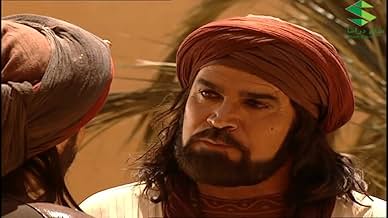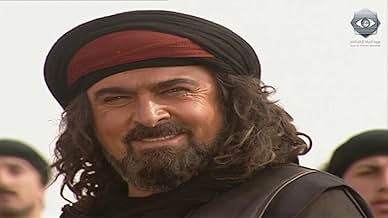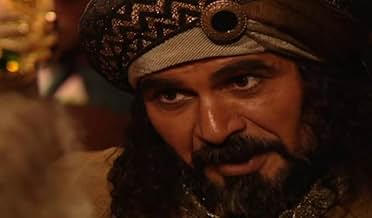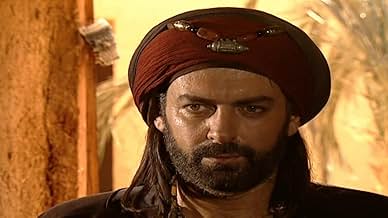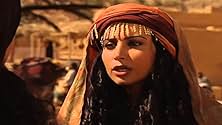IMDb रेटिंग
9.2/10
3.4 हज़ार
आपकी रेटिंग
अपनी भाषा में प्लॉट जोड़ेंA warrior-poet in pre-Islamic Arabia, Udai bin Rabia lived carefree until his brother King Kolaib's murder. Known as Al-Zeer, he led tribe Taghlib in the decades-long Basus war seeking venge... सभी पढ़ेंA warrior-poet in pre-Islamic Arabia, Udai bin Rabia lived carefree until his brother King Kolaib's murder. Known as Al-Zeer, he led tribe Taghlib in the decades-long Basus war seeking vengeance.A warrior-poet in pre-Islamic Arabia, Udai bin Rabia lived carefree until his brother King Kolaib's murder. Known as Al-Zeer, he led tribe Taghlib in the decades-long Basus war seeking vengeance.
एपिसोड ब्राउज़ करें
Rafik Ali Ahmad
• 2000
Najah Al Abdullah
• 2000
Khaled Taja
• 2000
Taj Haydar
• 2000
Iyad Abu Al Shamat
• 2000
Alaa Al Zuabi
• 2000
Muhannad Qatesh
• 2000
Fadia Khattab
• 2000
फ़ीचर्ड समीक्षाएं
This series is originally 40 episodes. I can help you listing them.
Overview A historical series embodying the character of Al-Zeer Salem, whose story happened in the pre-Islamic era. And presents the events of the Al-Basus War.
Jalila was married to Kulayb, the leader of the Taghleb tribe, who was known to be extremely protective of his property and land. He saw Al-Basous' foreign camel in his territory, and shot it with an arrow. Al-Basous in turn got furious and exaggeratingly complained to her nephew that she was humiliated and insulted by this act. Jassas, enraged by his aunt's words went to the leader of Taghleb, his brother in-law in the wild, and shot him with a spear from the back, a sign of cowardice and betrayal to Antiquity Arabs. Jasas was scared of his deed, and ran off, Amr or Omar (Jasas' friend) stayed there. Kulaib asked for water, but Amr shook his head in awe and chased after his friend. Kulaib stayed in the wild screaming for help, dying. After walking in the wilderness, he finds a shepherd, who gives him water, Kulaib asks him to check if the wound is fatal, the shepherd refuses, kulaib forces him to, so the shepherd does, and sure enough, its fatal. Kulaib gets mad and declares his revenge from Bakr and Jasas, then it is said that he either tells the shepherd a poem telling his brother Abu Layla al-Muhalhel to take revenge or he uses this blood to write in Arabic on a cliff wall his will to al-Muhalhel. This triggered the war between the two tribes. Later on in the war, one of Bakr's allies, a tribe leader called Al-Harith ibn Abbad, thought that he would not drag himself and his people into this silly war, over and above, he took an initiative to stop the blood-shed by sending his son, Ojayr, to now leader of Taghleb and brother of the late Kulayb, al-Muhalhel, for truce.
Overview A historical series embodying the character of Al-Zeer Salem, whose story happened in the pre-Islamic era. And presents the events of the Al-Basus War.
Jalila was married to Kulayb, the leader of the Taghleb tribe, who was known to be extremely protective of his property and land. He saw Al-Basous' foreign camel in his territory, and shot it with an arrow. Al-Basous in turn got furious and exaggeratingly complained to her nephew that she was humiliated and insulted by this act. Jassas, enraged by his aunt's words went to the leader of Taghleb, his brother in-law in the wild, and shot him with a spear from the back, a sign of cowardice and betrayal to Antiquity Arabs. Jasas was scared of his deed, and ran off, Amr or Omar (Jasas' friend) stayed there. Kulaib asked for water, but Amr shook his head in awe and chased after his friend. Kulaib stayed in the wild screaming for help, dying. After walking in the wilderness, he finds a shepherd, who gives him water, Kulaib asks him to check if the wound is fatal, the shepherd refuses, kulaib forces him to, so the shepherd does, and sure enough, its fatal. Kulaib gets mad and declares his revenge from Bakr and Jasas, then it is said that he either tells the shepherd a poem telling his brother Abu Layla al-Muhalhel to take revenge or he uses this blood to write in Arabic on a cliff wall his will to al-Muhalhel. This triggered the war between the two tribes. Later on in the war, one of Bakr's allies, a tribe leader called Al-Harith ibn Abbad, thought that he would not drag himself and his people into this silly war, over and above, he took an initiative to stop the blood-shed by sending his son, Ojayr, to now leader of Taghleb and brother of the late Kulayb, al-Muhalhel, for truce.
One of the best TV shows/ series ever been.
I keep watching it all the time. Non-stop.
Greatest performance.
10vmbyw
It's truly remarkable to think that such a monumental series was produced on a budget of only $800,000. During its time, we were blessed with stars who were not just celebrities, but true artists with a depth and a mission. Their performances were driven by a genuine passion for storytelling and a desire to convey meaningful messages. This is in stark contrast to the landscape of some of today's Arab entertainment, where performers often prioritize flashiness over substance.
It's rather alarming to realize that in our current era, an average series might dedicate as much as $300k just for the main actor's salary. This raises significant questions about the direction in which Arabic drama is moving, and whether true artistry is being overshadowed by the allure of big budgets and superficial stardom.
Salloum Haddad deserves immense praise for his outstanding performance, as do all the actors who poured their heart and soul into this project. Their dedication and commitment are palpable in every scene.
I'm genuinely hopeful that there will be a continuation of this saga. Whether it's a prequel delving into the origins of the story, or a sequel to explore the aftermath, there's so much potential for it to become the "Game of Thrones" equivalent for Arab audiences. Such a continuation would not only honor the original but also provide a platform for the rich tapestry of stories that the Arab world has to offer.
It's rather alarming to realize that in our current era, an average series might dedicate as much as $300k just for the main actor's salary. This raises significant questions about the direction in which Arabic drama is moving, and whether true artistry is being overshadowed by the allure of big budgets and superficial stardom.
Salloum Haddad deserves immense praise for his outstanding performance, as do all the actors who poured their heart and soul into this project. Their dedication and commitment are palpable in every scene.
I'm genuinely hopeful that there will be a continuation of this saga. Whether it's a prequel delving into the origins of the story, or a sequel to explore the aftermath, there's so much potential for it to become the "Game of Thrones" equivalent for Arab audiences. Such a continuation would not only honor the original but also provide a platform for the rich tapestry of stories that the Arab world has to offer.
10azozgh
It's the only arabic perfect show
It's based on true story which takes place now in saudi arabia " albaha "
Two colts fighting one of the longest wars in world
They tried to re create the story as it was and they did an excellent job
The best Arabic integrated series in everything in terms of actors, director, text and performance I hope Netflix network to translate the series and presented on the platform
टॉप पसंद
रेटिंग देने के लिए साइन-इन करें और वैयक्तिकृत सुझावों के लिए वॉचलिस्ट करें
- How many seasons does Al-Zeer Salem have?Alexa द्वारा संचालित
विवरण
- रिलीज़ की तारीख़
- कंट्री ऑफ़ ओरिजिन
- आधिकारिक साइट
- भाषा
- इस रूप में भी जाना जाता है
- الزير سالم
- फ़िल्माने की जगहें
- IMDbPro पर और कंपनी क्रेडिट देखें
- रंग
इस पेज में योगदान दें
किसी बदलाव का सुझाव दें या अनुपलब्ध कॉन्टेंट जोड़ें

